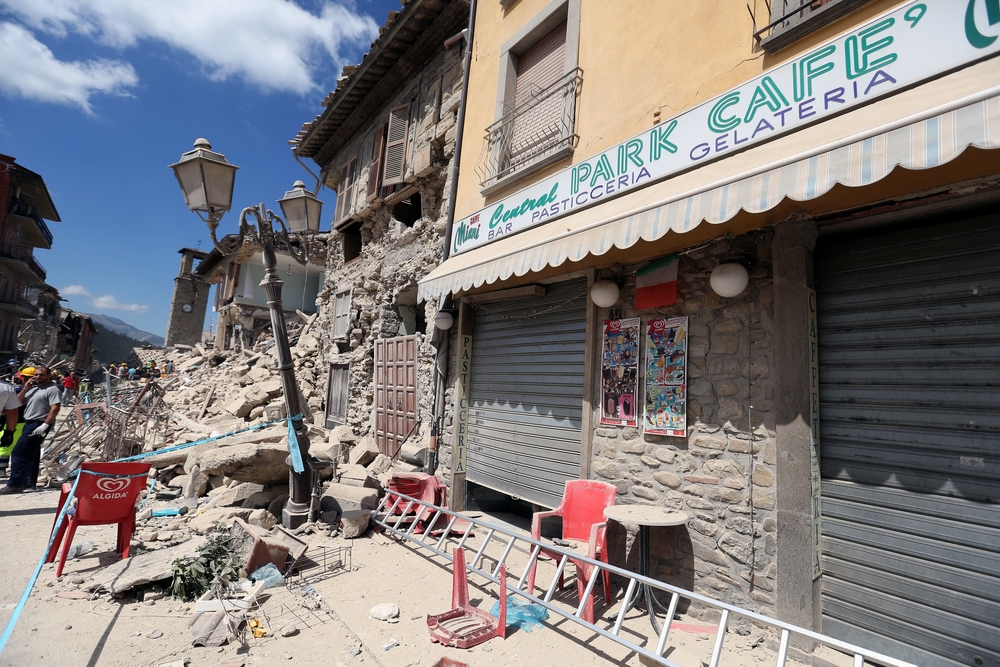The EU solidarity fund
Over the last 20 years, the EU has distributed more than 8 billion Euros to help member states and candidates deal with the consequences of natural or health disasters. How does the fund work? Which countries have benefited the most?

The-EU-solidarity-fund
Damages after the earthquake in Amatrice, Italy 2016 © Alessia Pierdomenico/Shutterstock
The European Union Solidarity Fund was established in 2002 in response to the severe floods that hit Central Europe during the summer of that year and has evolved into a key recovery tool after extreme events of different nature, demonstrating European solidarity. The main objective is to provide financial assistance to Member States and countries negotiating for EU membership, helping them recover from natural disasters and, more recently, major health emergencies.
Between 2002 and 2022, the European Union Solidarity Fund was instrumental in mobilizing over 8.2 billion Euros to address 127 different crises, including 107 natural disasters and 20 health emergencies. The beneficiaries included 24 EU Member States, the United Kingdom and three accession countries: Albania, Montenegro and Serbia.
The fund targets various types of disasters: floods were the most frequent, followed by fires and earthquakes, which require the most financial support due to their catastrophic impact and the amount of funds needed for the reconstruction of the affected areas.
Italy is the country that has received the largest share of the funds, exceeding 3 billion Euros, especially thanks to the huge contribution received after the devastating earthquake of 2016. Germany follows with approximately 1 billion and 650 million Euros, while Croatia received over 1 billion Euros in total, allocated especially following the earthquakes in 2020-2021.
Since April 2020, due to the Coronavirus pandemic, the European Union Solidarity Fund has expanded its scope to include major public health emergencies. This extension covers a range of measures, including first response actions, the provision of medical care, the purchase of medical equipment, efforts to contain the spread of diseases and support for vulnerable groups.
The Fund operates on the basis of a categorisation system that distinguishes major, regional and neighbouring country disasters based on the economic damage compared to the wealth of the affected state, thus seeking to ensure targeted assistance that aligns with the specific needs of each country depending on the type of crisis being faced.
As stated by Elisa Ferreira, European Commissioner for Cohesion and Reforms in the aftermath of the allocation of 33.9 million Euros to Romania to repair the damage caused by the severe drought and forest fires of 2022: "EU solidarity is a tangible way to demonstrate our solidarity and support and is crucial in the face of inexorable climate change".
This content is published in the context of the “Energy4Future” project co-financed by the European Union (EU). The EU is in no way responsible for the information or views expressed within the framework of the project. The responsibility for the contents lies solely with OBC Transeuropa.
Tag: Energy for Future
Featured articles
- Take part in the survey
The EU solidarity fund
Over the last 20 years, the EU has distributed more than 8 billion Euros to help member states and candidates deal with the consequences of natural or health disasters. How does the fund work? Which countries have benefited the most?

The-EU-solidarity-fund
Damages after the earthquake in Amatrice, Italy 2016 © Alessia Pierdomenico/Shutterstock
The European Union Solidarity Fund was established in 2002 in response to the severe floods that hit Central Europe during the summer of that year and has evolved into a key recovery tool after extreme events of different nature, demonstrating European solidarity. The main objective is to provide financial assistance to Member States and countries negotiating for EU membership, helping them recover from natural disasters and, more recently, major health emergencies.
Between 2002 and 2022, the European Union Solidarity Fund was instrumental in mobilizing over 8.2 billion Euros to address 127 different crises, including 107 natural disasters and 20 health emergencies. The beneficiaries included 24 EU Member States, the United Kingdom and three accession countries: Albania, Montenegro and Serbia.
The fund targets various types of disasters: floods were the most frequent, followed by fires and earthquakes, which require the most financial support due to their catastrophic impact and the amount of funds needed for the reconstruction of the affected areas.
Italy is the country that has received the largest share of the funds, exceeding 3 billion Euros, especially thanks to the huge contribution received after the devastating earthquake of 2016. Germany follows with approximately 1 billion and 650 million Euros, while Croatia received over 1 billion Euros in total, allocated especially following the earthquakes in 2020-2021.
Since April 2020, due to the Coronavirus pandemic, the European Union Solidarity Fund has expanded its scope to include major public health emergencies. This extension covers a range of measures, including first response actions, the provision of medical care, the purchase of medical equipment, efforts to contain the spread of diseases and support for vulnerable groups.
The Fund operates on the basis of a categorisation system that distinguishes major, regional and neighbouring country disasters based on the economic damage compared to the wealth of the affected state, thus seeking to ensure targeted assistance that aligns with the specific needs of each country depending on the type of crisis being faced.
As stated by Elisa Ferreira, European Commissioner for Cohesion and Reforms in the aftermath of the allocation of 33.9 million Euros to Romania to repair the damage caused by the severe drought and forest fires of 2022: "EU solidarity is a tangible way to demonstrate our solidarity and support and is crucial in the face of inexorable climate change".
This content is published in the context of the “Energy4Future” project co-financed by the European Union (EU). The EU is in no way responsible for the information or views expressed within the framework of the project. The responsibility for the contents lies solely with OBC Transeuropa.
Tag: Energy for Future










